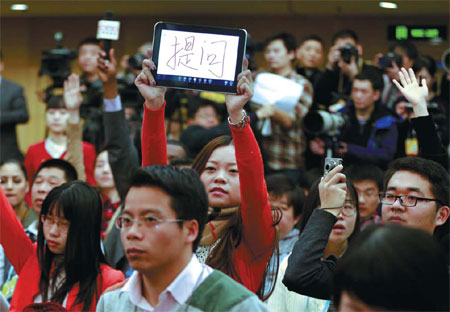Civil societies get government boost
Updated: 2013-03-14 07:03
By He Dan and Rong Xiandong (China Daily)
|
||||||||
|
A journalist raises a computer tablet reading "I have a question", at a news conference on people's livelihood and social services during the first session of the 12th National People's Congress in Beijing on Wednesday. Feng Yongbin / China Daily |
Planned legislation will enhance development, growth of NGOs
The government will encourage civil societies to play a greater role by simplifying registration while beefing up supervision, Civil Affairs Minister Li Liguo said on Wednesday.
Experts and industry insiders welcomed the government's pledge but urged concrete action for real change.
Li said the State Council's recently announced reconstruction plan has shown a path for transferring more government functions to society.
He said that launching four types of non-governmental organizations - industrial associations, charities, community services and organizations promoting technology - will entail direct registration with the civil affairs authorities, eliminating the pre-examination and approval of other regulators.
Dou Yupei, vice-minister of civil affairs, said China will speed up legislation concerning charities and promote their development by acknowledging the growing importance of these organizations.
"Charity organizations ... now face a 'spring for development' as the government restructuring plan unveiled on March 10 encourages the role of social organizations in society," said Dou.
The plan acknowledges that the requirements for establishing social organizations are too high, and even some non-governmental organizations tend to operate in a bureaucratic way like government departments.
Dou said China will create a better environment for the development of charities.
A national charities federation will be established soon to improve self-regulation in this area, Dou said.
Meng Weina, director of Beijing Huiling Community Services for People with Learning Disabilities, said it will submit its application for registration again in a couple of days "to see whether the government will fulfill the promise of direct registration".
"We have tried about 100 times in the past 13 years since I founded the organization but failed time and time again as we cannot find a regulator to be affiliated with," she said, adding that her organization faces challenges to earn public trust and a tax exemption without a legal identity.
"It's significant that the central government has realized the importance of giving more space for NGOs to grow and let them take over some responsibilities," said Deng Guosheng, an expert specializing in NGO studies at Tsinghua University in Beijing.
He urged civil affairs authorities to provide financial investment, training programs and other forms of support to improve NGOs' capabilities.
"At the same time, the government should also perfect the evaluation mechanism for NGOs' performance to prevent the waste of resources," he said.
Li said the ministry will ensure that fundraising and other operations of social organizations will be under closer watch.
The government will also work harder to facilitate public supervision of social organizations by setting up an information platform, where the general public and media can check registration details, results of annual inspections and evaluations of social organizations, he said.
Grassroots democracy
About 600 million people in rural China will participate in direct elections for village committees by the end of 2013, said Jiang Li, vice-minister of civil affairs, responding to a question on Wednesday about China's grassroots democracy.
There are 589,000 village committees in the mainland's rural areas, of which 98 percent are directly elected, she said.
She stressed that the direct election of a new village committee in Wukan village, Guangdong province, last March was not an exceptional case in China.
About 400 villagers in Wukan rallied to protest against illegal land seizures in late 2011, and months later they voted to select their new leaders after the intervention of the provincial government.
However, media reported that thorny issues, including land use rights, remain unsolved after the election of a new village committee in Wukan.
Jiang said the protest was due to economic disputes, and the newly elected village committee should solve the remaining problems by engaging all local farmers in the decision-making process.
Contact the writers at hedan@chinadaily.com.cn
(China Daily 03/14/2013 page5)

 In Photos: 7.0-magnitude quake hits Sichuan
In Photos: 7.0-magnitude quake hits Sichuan
 Li Na on Time cover, makes influential 100 list
Li Na on Time cover, makes influential 100 list
 FBI releases photos of 2 Boston bombings suspects
FBI releases photos of 2 Boston bombings suspects
 World's wackiest hairstyles
World's wackiest hairstyles
 Sandstorms strike Northwest China
Sandstorms strike Northwest China
 Never-seen photos of Madonna on display
Never-seen photos of Madonna on display
 H7N9 outbreak linked to waterfowl migration
H7N9 outbreak linked to waterfowl migration
 Dozens feared dead in Texas plant blast
Dozens feared dead in Texas plant blast
Most Viewed
Editor's Picks

|

|

|

|

|

|
Today's Top News
Live report: 7.0-magnitude quake hits Sichuan, heavy casualties feared
Boston suspect cornered on boat
Cross-talk artist helps to spread the word
'Green' awareness levels drop in Beijing
Palace Museum spruces up
First couple on Time's list of most influential
H7N9 flu transmission studied
Trading channels 'need to broaden'
US Weekly

|

|








